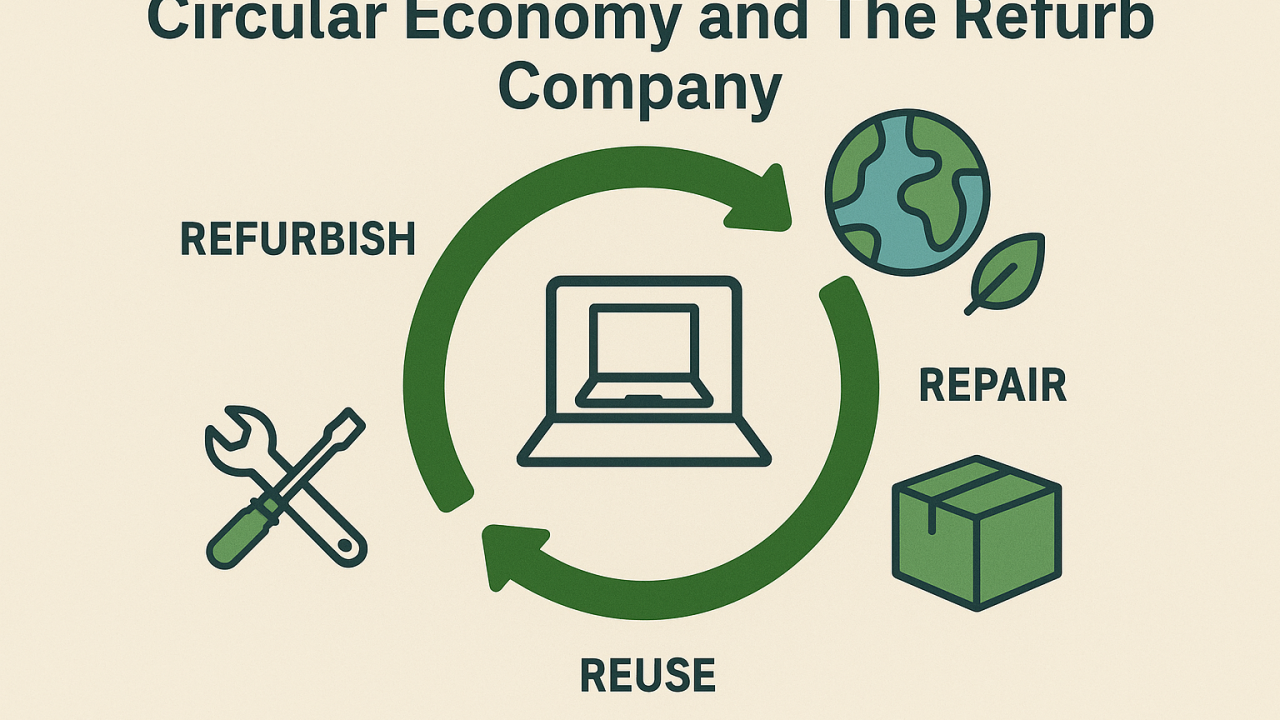The Refurb Company significantly contributes to a circular IT economy through its core philosophy and a range of innovative services designed to extend the lifespan of electronic devices, reduce waste, and minimise carbon footprints. The company's mission revolves around emphasising repair and refurbishment over replacement and promoting a circular IT model. They believe that every new laptop produces around 400 kg of carbon and uses 4,000 litres of water, so promoting refurbished and reused laptops saves a lot of carbon and water.
Here's how their services and practices align with a circular economy:
- Think Global, Refurbish Local (TGRL) The Refurb Company champions the "Think Global, Refurbish Local" motto, advocating for refurbishment within a device's country or region of origin rather than shipping it globally for cheaper labour. This approach significantly reduces carbon emissions associated with global transportation and supports local economies by creating jobs and fostering skilled labour. They provide tools and training to other companies to enable them to perform refurbishment locally. The company aims to have production facilities in Australia and the USA by 2025 to support worldwide local refurbishment efforts.
- Sustainable Operations and Energy Use The Refurb Company's facility in Poole, UK, is powered by 240 solar panels for electricity and a biomass boiler for heating, meaning they do not use gas or oil on-site. They aim to achieve 100% on-site electricity generation within the next 12 months through additional solar panels and battery storage. This commitment helps them add no carbon in their refurbishment process. They believe that using fewer resources and reusing wherever possible also makes good financial sense.
- Skinz™ for Extended Device Life and Reduced Waste TRC Skinz™ are high-quality vinyl wraps that restore the cosmetic condition of laptops and devices, making them look new. By improving aesthetics, Skinz™ increase the perceived value and lifespan of devices, preparing them for second and third life cycles from day one. This directly promotes a circular economy by keeping devices in use longer.
- SticKeys™ for Keyboard Reuse and Carbon Reduction SticKeys™ are removable and reusable keyboard overlays that refurbish keyboards without needing to replace them, reducing electronic waste. They recreate the look and feel of original keyboards and can be applied in situ, making them ideal for the refurbishment industry and for companies renting laptops.
- Screen Savers™ for Screen Refurbishment Screen Savers™ are a patented, cost-effective solution for refurbishing laptop screens by covering keyboard etching and light scratches without disassembling the screen. This avoids the need for screen replacement, which has a significant environmental impact.
- 3D Printing for Parts Replacement The Refurb Company uses low-cost resin 3D printers to create replacement parts like rubber feet, trackpointers, HDD caddies, and battery covers. This allows for local production of parts, reducing reliance on imported parts from China. They use plant-based, biodegradable resin, further reducing plastic waste in landfills and contributing to a lower carbon footprint.
- Comprehensive Refurbishment Services The company offers full refurbishment services for Windows laptops, MacBooks, and Chromebooks, focusing on retaining original parts as much as possible rather than replacing functional components. They aim to take Grade B/C laptops to an 'as new' standard. Their overall refurbishment process for laptops uses 20% of the carbon emitted compared to remanufacturing. They also actively research and develop new processes for refurbishing laptop batteries and reusing battery cells in other items.
In summary, The Refurb Company contributes to a circular IT economy by extending the life of devices, reducing waste, minimising carbon emissions through local refurbishment and renewable energy use, and offering services like Skinz™, SticKeys™, and Screen Savers™ that enable reuse and repair over replacement.

